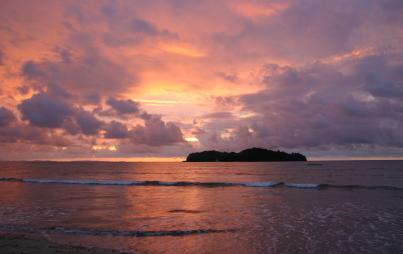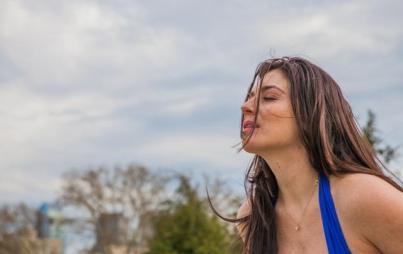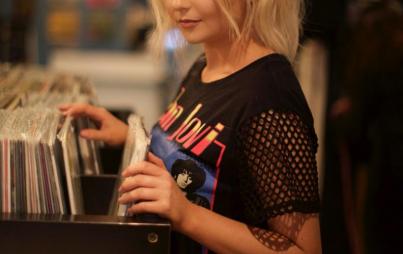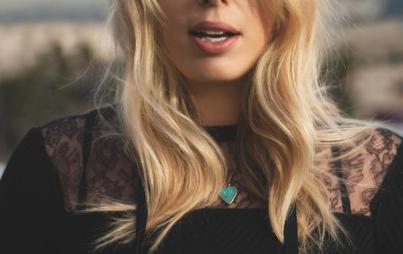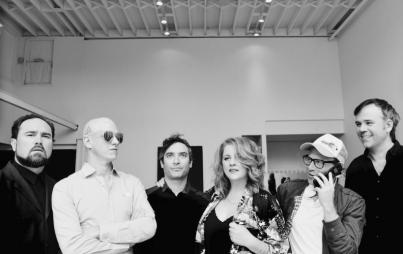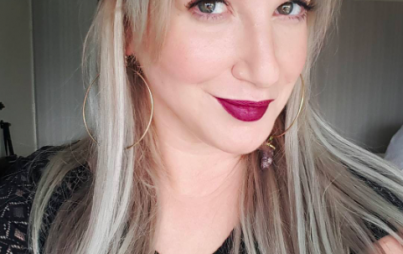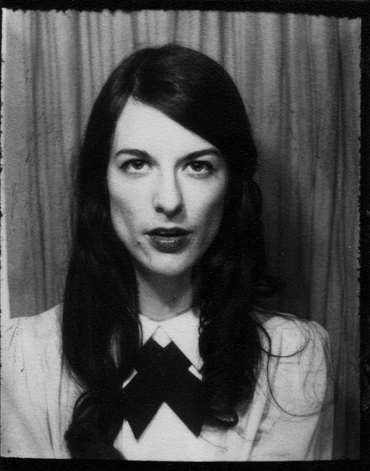
In truth, I first stumbled upon Chelsea Hodson's work on Twitter, of all places. I was combing thorugh Miranda July's feed as I had (obviously) just purchased and devoured her new novel—The First Bad Man—and wanted to bask in and huff out her digital life wanderings. There I discovered a tweet: "When you accidentally hand the passport guy PITY THE ANIMAL instead of yr passport and he's like UH." Above it hovered a photograph of the work in question.
Look at that kelly green meets pea-soup neo-1970s handbook! I thought. What an intriguing title. What's it all about? Who is this Chelsea Hodson?
I was instantly overcome with the beautiful sensation that I was observing the elusive public self of a spooky, All Girl's Club where brilliant, maybe angry, maybe sad, but definitely brilliant—emitting light!—women gathered in shadows and spotlights, caves and cathedrals, and told it how it is.
Hodson is currently getting her MFA at Bennington College, but has already stormed the literary scene with her alternatively stark and sensual prose; she is an apt observer, an over processor, a confessor. She is openly complicated and unreconciled. Her pieces are almost entirely nonfiction; she's authored two chapbooks—Beach Camp (2010) and Pity the Animal (2014)—and was named a PEN Center USA Emerging Voices Fellow in 2012.
Her essays on lust, childhood, loneliness, being watched—archetypal tales in some ways—are rendered anew, forged in a kind of pastiche that couples together observations, letters, emails, scraps of paper; it's like peering into the pages of a mind-journal.
We caught up with her to talk craft, creativity, and of course, the commodification of the human body.
Lie down on the couch and tell me a bit about your childhood. Your grew up outside Phoenix, Arizona . . . what was that like? What’s your most visceral memory from growing up?
Now, there are sand-colored strip malls everywhere in Phoenix, but when I was in elementary school, there were still cornfields surrounding my school. One day, my friend’s mom was driving us home and I saw a funnel cloud forming over a cornfield. “Is that pollution?” I asked, and my friend’s mom screamed. The little black cloud pointed down like a finger, then shriveled back up into the sky.
Where and when do you write? Are you a “I always sit down and scrawl every morning from 8-11” or a, “Holy shit! it’s all happening, I better stop everything and write. Right now.”
I try to write every morning, but freelance life sometimes interferes. I’ve been pretty consistent for the past year, though. I will periodically adopt other people’s routines, too—for instance, I read in Bookforum that Atticus Lish is writing 2,000 words a day on his new book, so now I’m copying him and doing that, too. I like to feel connected to writers I like, even in an artificial way. 
When did you decide to write Pity the Animal and why?
I wanted to explore the difference between human, animal, and object. I thought, if we can sell all three of these things, how do we distinguish the differences between them? I began by studying the ways in which performance artist Marina Abramovic uses her body as art, and went from there. I began writing it in the summer of 2013, felt frustrated by it, worked on other things, and then completed it in 2014. Sometimes I have to look away from things for awhile. Usually when I return after an absence, things become clearer, missing links become obvious, and I can braid it to completion.
Pity the Animal is all about the commodification of the body—and how it's permeated every facet of society if you look closely enough (from performance art a la Marina Abramovic to prostitution, modeling, dating, window displays, hunting, video games, etc. ad nauseum). But you take a fairly different stance than many women, especially "feminists"; you write rather openly about your desire to be commodified as a means of acquiescing control. Can you talk a little bit about that?
Well, as Kathleen Hanna wrote in the Bikini Kill song "Jigsaw Youth," "I can sell my body if I wanna." I don't see it as an anti-feminist sentiment at all—to me, feminism is about the freedom to make any decision you want. The world feels so complicated to me—I thought, what if it was as simple as me receiving money for being female? It's not a compulsion I felt especially proud of, but it felt worthy of exploration, even just intellectually. And I certainly didn't seek out more control; that was an unexpected outcome of my interactions.
You write: "I didn't need to reduce myself to an object in order to be sold. I needed only to be animal." When you couple this thought with the original impetus for your chapbook's title, a shred of paper within an old library book you found that read: "Pity the animal that has no animal in it," there is a sense of strange vertigo somehow.
I loved that scrap of paper—I found it in a book I'd requested from offsite storage. Because the book was so old and fragile, the librarian handed it to me wrapped in paper and twine. It was like opening a present, and finding that scrap of paper was like a second present because it seemed to validate what I was writing, in a way. Desire is strange and complicated and disgusting and animal, but that element of instinct and ambiguity is what interests me.
Can you tell me a little about the “Inventory” project which catalogued (with prose) every single possession you own? One of my best pals for college is a total packrat—like me—and our lives are just filthy snowballs of possessions imbued with memories that we are SO RELUCTANT to give away, even though neither of us would describe ourselves as materialistic by any stretch of the imagination.

I’m not like that at all—I hardly ever feel sentimental toward material possessions. That’s why I thought I could conceivably catalogue everything I owned. I thought, “It all fits in a few boxes, how long could it possibly take?” Well, the answer was: 657 days, 657 objects. I love things that are purely American, and being materialistic is so American. I wanted to use the things I owned as a way of cataloguing my memories and my mind. Once I saw a narrative forming and evolving, I wanted to perform the piece in its entirety without any of the objects present. It felt important to me to perform it without stopping, and that did end up being satisfying to me. I saw the project from an entirely new perspective, and I also felt that I never needed to look at it again. The week after the performance, I mourned the loss of something that had been with me every day for almost two years. The week after that, I got over it.
You’ve talked a bit about your alternating desire and aversion to the spotlight, to being watched and seen. Do you feel like you’ve managed to reconcile some of this in reading your work out loud in the creation of your trailers? Or does one have nothing to do with the other . . .
I perform in my trailers because of my limited resources. If I had a ton of money when I was making the Pity the Animal trailer, I would have hired a professional filmmaker with an HD camera, a video editor, a dancer, and a musician. Instead, I propped my iPhone up in a cheap hotel room during the AWP conference in Seattle, improvised movement within the room, and then recorded an Oingo Boingo song on my laptop. I figured, why not? It’s a chapbook—no one’s expecting a trailer. But there are these visual images that haunt me as I’m writing—ones that don’t fit in anywhere within the text, so it’s satisfying to realize them through film.
We always ask: What’s your relationship to feminism? Is being a woman and/or possessing a vagina part and parcel of your writing? Your headspace? Your interaction with the world?
Being a woman informs nearly everything I do. It makes me weak, it makes me strong. I often wish I were a man, but I also love being a woman, especially in a time in which female essayists are taken so seriously. The world is imperfect, gendered interactions are imperfect. I’ve done things like clinic escorting at a pro-choice clinic in Jamaica, Queens, but I would end up just falling to pieces afterward—crying at the awful things religious protesters would say to women who were just going in for a check-up. Not everyone is emotionally equipped to be outwardly political. Some of us are equipped to take notes, though.

Mine. Is it done yet? I don’t wish I’d written anyone else’s book, though I think Tampa by Alissa Nutting is a perfect book.
Sometimes when I let my anxiety and self-loathing get the best of me, I start demanding to know why the hell I even write. Why am I screaming into this void instead of striving to solve some problems on this twisted little blue planet of ours? Do you ever feel like that? What do you tell yourself when the malaise sets in? Why is art important?
No, I feel the opposite. I feel overwhelmed by the world’s problems, so I start small: I investigate my own world. It’s like making a to-do list and checking off the easiest thing first. Shower. Check.
What are you reading right now?
I just finished Atticus Lish’s Preparation for the Next Life and Mary Ruefle’s Selected Poems, two very different books that both made me weep. Next on my list is Lynne Tillman’s American Genius.
**
Get your hands on Hodson's work here and here and here. It's heady, delicious stuff. And of course, check out her website, follow her on ze Twitter, and watch this:

